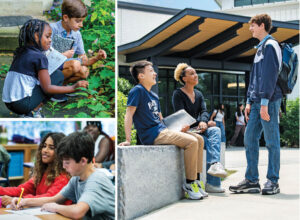Technology Resources
Now is an incredibly exciting time for learners with unparalleled access to information, connectivity, data analysis, and dynamic content delivery. Schools play a vital role in modeling 21st-century learning, equipping students with essential digital skills. As Chief Technology Officer, I invite you to explore technology in education at AFS and beyond.
- John Rison
- Chief Technology Officer
The Upper School Bring Your Own Device Requirement
At AFS, we believe in giving students the freedom to choose devices that suit their needs. For students in grades 9 through 12, we commend devices with:
- At least a 10.0 inch screen;
- Wi-Fi capablility;
- An up-to-date web browser that supports Google Apps; and
- Can hold a charge for over 3 hours.
The device that students bring should not be a cell phone or a smartphone.
Here are some device options and advice to help you decide:
- Macbook Air: High-quality, fast, and lightweight with an extended battery life. Starts around $1,000.
- Chromebook: Ideal for web-based tasks and Google Apps integration. Reasonably priced, starting at $280.
- iPads: Great for access to apps and resources, starting at $299. Pair with a Bluetooth keyboard for typing.
- Laptops: Various Windows and Linux options available, starting at around $300. Consider factors like weight, battery life, and functionality.
- Tablets: Diverse selection, ranging from $75 to over $600. Opt for established devices around $300 for reliability.
The Middle School Chromebook Program:
We provide Chromebooks to all Middle School students, embracing digital tools for anytime, anywhere learning. Chromebooks are lightweight, solid laptops with long-lasting batteries and Google Apps integration. They are school-owned, guiding students’ online experience and fostering digital habits.
AFS and Google Apps for Education:
Google Apps for Education is a suite of tools, including Gmail, Docs, and Sheets, empowers students, faculty, and administrators to connect, collaborate, and create. This shift allows for easy sharing, calendar management, and website creation, preparing students for higher education and beyond.
Suggested Reading and Resources:
For parents navigating the digital age, we recommend these resources on positive modeling, setting boundaries, and monitoring screen time for educational and recreational purposes:
- Common Sense Media (www.commonsensemedia.org)
- MindShift (https://www.kqed.org/mindshift)
- Edutopia (www.edutopia.org)
- TechCrunch (www.techcrunch.com)
- Technically Philly (https://technical.ly/philly/)
- Wired (www.wired.com)
Parents can also explore Pew Research Internet Project for technology trends and the Social Media Guide for parents and educators. For parental control apps and services, websites like Mobicip, OurPact, and SecureTeen can be helpful.
Books about social media:
For a deeper understanding of social media effects, consider these recommended books:
- Alone Together by Sherry Turkle
- The Distraction Addiction by Alex Soojung and Kim Pang
- It’s Complicated by danah boyd
- The Art of Screen Time by Anya Kamenetz

